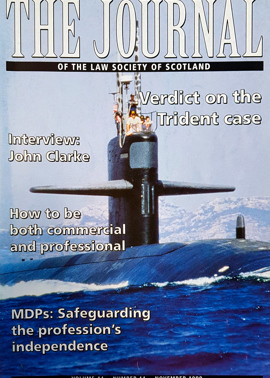House builders' missives
The following article has now been discussed between the Conveyancing Committee and the SHBA’s Council. It must be acknowledged by members of the profession that the SHBA is not in a position to dictate to its members that these matters be incorporated in their missives.
Deposits
The Conveyancing Committee and the SHBA accept that a deposit scheme is undoubtedly an integral part of the new building industry, and to the extent that the deposit is primarily a guarantee of performance to be forfeited in the event of failure and is related to the actual loss that might be incurred in the event of non-performance, the scheme represents acceptable practice. However, substantial deposits should neither be sought nor paid unless (a) there is prior agreement as to a refund to the purchaser of the amount of deposit paid in excess of actual loss to the builder and (b) appropriate precautions are taken to endure the refund of the deposit to the purchaser in the event of failure/liquidation of the builder.
Payment of the purchase price including telegraphic transfers
- It is axiomatic that payment of the price should be made in exchange for the exhibition of a clear marketable title and delivery of a validly executed conveyance. In the context of new build, it is agreed that payment of the price will not be sought unless and until the property in question has been inspected and passed as fit for occupation or complete for the purpose of issue of an occupation or Completion Certificate by a Local Authority Building Control Inspector. Confirmation that the property has been passed as fit for occupation or complete will act as a trigger for purchasers’ solicitors to arrange re-inspections and release of loan funds. It is recommended that fourteen working days be the standard period permitted after intimation before penalty interest is charged.
- Electronic same day transfers of funds are becoming increasingly common and hopefully will become the standard method of payment for all transactions. It should be recognised, however, that not all lending institutions offer an electronic payment service and that purchasers who are themselves part of a chain may be relying on funds being received in respect of their own sale. Moreover, it should be recognised that “same day” transfers are at present “sometime during the day” transfers and that the banking system itself can be the cause of frustrating delays. The Conveyancing Committee is hoping to improve these procedures through its regular dialogue with the Council of Mortgage Lenders.
- The Committee is of the view that the custom of settlement being effected between solicitors should be continued and it appreciates that telegraphic transfer is the preferred method of settlement for most builders. It is accepted by the SHBA that requests to send cheques/transfer monies directly to the builders are not readily acceptable to solicitors and that payments should be made to builders’ solicitors.
Productions of permissions, consents, searches in the companies file at Register House and charges searches
The SHBA generally takes the view that the production of planning permission and building warrants for any particular development is not necessary provided that the builder warrants that all necessary consents etc have been obtained. The Conveyancing Committee is of the view that where the practitioner feels it is appropriate, it is not unreasonable for missives to provide that copies of the planning permission and building warrants should be made available for exhibition to the purchaser’s solicitor.
The Conveyancing Committee is of the view that it would be extremely helpful if builders’ solicitors could produce searches to the purchasing solicitor. Thereafter it would be helpful if the builders’ solicitors could confirm that from the date the search was brought down to, until the date of settlement, no further floating charges etc had been created and that nothing untoward had happened. The SHBA are reluctant to agree to this course of action, but confirm that they will point out the practicalities of the situation to their members and will draw to their attention the fact that this would be an extremely helpful aid to purchaser’s solicitors.
Variation of materials and estate layout
The Conveyancing Committee accepts that house builders require the facility to vary materials provided that such variations do not increase the cost and the materials used are of equivalent standard to those originally specified. The Committee has concerns about the frequency with which estate layouts are varied without any consultation with the purchaser.The SHBA accepts that this is a contentious area and that difficulties can occur. The SHBA takes the view that house builders should be prepared to provide purchasers with adequate information at an early stage when significant changes to an estate layout are required.
Factoring and title conditions
The Conveyancing Committee accepts the need for builders to reserve a right to appoint a property manager or factor in many estates and especially in flatted or sheltered housing developments. It also accepts that purchasers should be responsible for a portion of the factor’s fees, costs, expenses and outlays. If builders ask for a payment to go to a factor, it is natural that purchasers will wish details of the factor to be provided during the missive negotiations rather than paying to an unknown factor during the transaction. The SHBA are agreed.
As far as a proforma style of missives is concerned members may be interested to note that the SHBA have looked at the proforma style of missives suggested to them by the Conveyancing Committee. However, many of their members’ own solicitors had reservations about creating a building trade standard missive and their view is that there is no possibility of the SHBA Council accepting this proposition in the foreseeable future.






